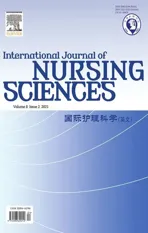Improve self-care in heart failure
2021-03-25
Heart failure(HF)is not a single disease,but a chronic and complex clinical syndrome in which the heart is unable to fill or pump the blood well because of structural and/or functional cardiac disorders [1].This leads to a decreased cardiac output that is insufficient to meet the body’s metabolic demands [2].A number of diseases affecting the cardiovascular system can lead to HF [1],but the most common causes are coronary artery disease,hypertensive heart disease,valvular heart disease,tachyarrhythmia and idiopathic causes [1,3].
HF is a major public health problem that places a significant disease burden on the society.Globally,about 38 million people are living with HF,with a reported prevalence of approximately 1%-2% in the adult population [4,5].The condition also becomes more common as one gets older.At age 55,the lifetime risk of HF is about 30%,and the risk doubles with each decade of age increased [6,7].For the individuals,living with HF is fraught with challenges.The tremendous symptom burden reduces the patient’s independence and ability to perform many activities of daily living,resulting in great functional impairment [8].Many patients report that they are poorly equipped to cope with the condition and that HF has a negative impact on their quality of life,psychological wellbeing and financial capacity [8].
Given the increased disease burden and the adverse impacts of HF,guidelines have been developed and published worldwide to help optimize HF management[9-11].Broadly speaking,the management strategies can be categorized into:1) medical management,that includes pharmacotherapy,surgical interventions or device therapy,and 2) self-management interventions,referring to multifaceted disease-management interventions that promote self-care in patients with HF [12].The common therapeutic approaches in medical management of HF include pharmacotherapy,surgical management,such as coronary artery bypass graft surgery(CABG),mitral valve repair,and device therapy,such as left ventricular assist device implantation[13,14].And self-management interventions,on the other hand,are interventions designed to improve patient knowledge,skills and engagement to appropriately carry out self-care activities [12].
Self-care are specific behaviors that patients perform on their own accord to control disease and maintain health[15].In HF,it encompasses a range of behaviors,from adhering to medication and treatment,avoiding excessive fluid and salt intake,monitoring daily weight,engaging in exercise,monitoring and identifying exacerbating symptoms,and taking appropriate steps to intervene if symptoms worsened [16].Self-care is the cornerstone of HF management.It improves treatment effectiveness,and reduces hospital admissions[17,18].Previous studies have shown that if patients practice constant self-care,30% of hospital admissions and more than half of the readmissions can be averted[17,18].As hospital stays are becoming shorter and less frequent,the responsibility for self-management has been gradually shifted to the patients and families.Therefore,self-management interventions that promote and support self-care after hospital discharge are also becoming increasingly important.
We recently conducted a three-arm stratified randomized controlled trial to evaluate the effectiveness of a newly developed multi-component nursing intervention (i.e.,the HOM-HEMP) in improving patients’HF self-care,cardiac self-efficacy,psychological wellbeing,health-related quality of life (HRQoL),perceived social support,and clinical outcomes among Singaporean patients[19,20].The intervention adopted a nurse-led home-based psychosocial and educational approach.In addition,we also incorporated a mHealth component(i.e.a supplementary smartphone app and a web-portal system) in one of the study arms [19].The results largely support our study hypotheses that patients who received the HOM-HEMP intervention had better HF self-care,cardiac selfefficacy,HRQoL,psychological wellbeing (lower depression level),functional status and fewer unplanned hospital admissions and emergency visits compared to those who did not receive the intervention[20].
The study provides insights into some of the effective ways to improve HF self-care and the important roles of a nurse in empowering patients in the care process[21].Today,health information is more readily accessible than ever before,but this does not necessarily make patients more informed about their diseases,and therefore patient education,especially individualized patient education,remains an important component of self-management interventions.Besides education,psychosocial factors have played an important role in the etiology and prognosis of cardiac diseases.It is already known that depression is associated with impaired self-care and poor clinical outcomes in patients with HF [22,23].The psychosocial approach that combined a psychological (e.g.,motivational interviewing) and social support (e.g.,regular home visits) components is an effective way to improved overall selfcare in patients with HF.The use of motivation interviewing technique helped foster the therapeutic relationship between the nurse and the patients.A good therapeutic relationship and an atmosphere of safe,nonjudgmental discussion facilitates the negotiation of self-care goals with the patients.In the study,older patients preferred to receive home visits as a form of engagement and felt that the advances in technology should complement and enhance care and not be a stand-alone mechanism of care [21].There is no doubt that mHealth and telemedicine have great potential to break through many barriers to healthcare delivery.Its roles and importance are even more evident in the context of the current COVID-19 pandemic.Nevertheless,there is still a need for future studies to determine adherence to the mHealth component of the study intervention and to validate the effectiveness of the mHealth component in improving self-care and hard clinical outcomes.
Like many other chronic diseases,there is no cure for HF,but the disease progression and its impact on quality of life can be mitigated through treatment and self-management.Living with HF is challenging,with many patients expressing frustration when they were unable to perform their daily work or social roles due to symptom burden and decreased physical function.Effective selfmanagement interventions help stabilize their lives while living with the limitations of functional capacity and the burden of illness.
Authors’contributions
All authors have agreed on the final version and meet at least one of the following criteria:
1.Substantial contributions to conception and design,acquisition of data,or analysis and interpretation of data.
2.Drafting the article or revising it critically for important intellectual content.
Declaration of competing interest
No conflict of interest has been declared by the authors.
Acknowledgement
The HOM-HEMP study was supported by the Health Services Research Grant (HSRGWS16Jul007) from National Medical Research Council (NMRC).
